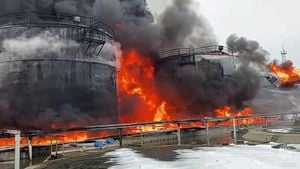Weather warnings for snow and ice are looming over parts of Scotland as temperatures start to plummet, signaling the first cold spell of the season. The Met Office has put out yellow warnings across northern England and southern Scotland from Sunday through Tuesday, with predictions of up to 20 cm (around 8 inches) of snow atop higher ground. This winter-like weather follows weeks of unseasonably mild, above-average temperatures, catching many by surprise.
According to BBC Scotland weather presenter Joy Dunlop, the drop in temperature this weekend is palpable. An Arctic airflow is sweeping through, promising wintry conditions, along with ice and snow. "While Sunday might see plenty of sunshine, it will still feel chilly," she notes, highlighting the potential for showers, particularly across the northwest and Northern Isles, which will turn progressively more wintry throughout the day. She warns of widespread frosts developing overnight as temperatures drop to freezing or lower.
Monday is set to usher in even more dramatic changes as low pressure approaches from the southwest. This system is likely to lead to spells of rain mixing with sleet and snow as it encounters the frigid Arctic air. Dunlop estimates most snowfall will occur on higher elevations, where accumulations of 5 to 10 cm can be expected above 300 meters. Even more staggering amounts of 15 to 20 cm are possible for locations above 400 meters.
Any snow at lower elevations poses complications, with the likelihood of 5 to 10 cm potentially causing significant disruptions—the specifics of this remain uncertain. After precipitation clears on Tuesday morning, untreated surfaces may also form ice, posing additional hazards.
Met Office spokesperson Grahame Madge remarked on the peculiar timing of this cold front. "Technically and meteorologically, we are not yet in winter. It’s still late autumn, as winter officially begins in December. But this is certainly the first notable cold snap we've seen this season." He notes the cold weather is expected to linger for about a week before milder Atlantic conditions potentially roll back in.
The weather warnings extend significantly throughout the UK, with the Met Office advising residents to prepare adequately. A detailed look at the warnings reveals they primarily affect southern Scotland and parts of northeastern England, including key areas like Yorkshire, Cumbria, and Lancashire. The yellow warnings reflect the seriousness with which the Met Office views the impending weather.
For anyone who might be unacquainted with the weather warning system, yellow means there could be some disruption to travel, alongside the possibility of injuries due to slips and falls. This has prompted officials to issue reminders about travel safety, encouraging drivers to be ready for potential delays and extra caution on icy roads.
Central and southern Scotland will need to pay special attention; this region is expecting snow and ice warnings from late Sunday through early Tuesday, with the most severe conditions hitting Monday. These areas could face serious challenges if the snow settles on lower land.
Deputy Chief Meteorologist Rebekah Hicks warns of the significant cold spell looming over the north. Once the Arctic air moves south, it will sweep across the UK, leading to temperatures dropping sharply. Wintry weather is slated to commence prominently over high grounds initially, bringing the risk of snow and gusty winds, which could also create hazardous conditions.
Simultaneously, weather maps from WXCharts point toward areas likely to avoid substantial snow. For example, much of the southern UK, including London and regions extending to the south coast, may not see snow during this round of winter weather. This forecasted pattern is likely to persist, offering some respite to those living farther south.
Peering beyond this winter spell, forecasters are exploring various scenarios of what might occur next week. There is uncertainty around how much – if any – widespread snow might manifest at lower levels, indicating fluctuational weather patterns. What is clear, though, is the UK is expected to navigate some challenging weather conditions soon.
Britons are being urged to stay informed about the latest weather updates and to be vigilant during this cold transition. Precautions are recommended, with friends and families checking on elderly relatives and vulnerable individuals who may require additional support, especially during inclement weather.
Health experts, like NHS24’s Associate Medical Director Dr. Siama Latif, have stepped up to issue health advisories for the public’s safety. She stresses the importance of warm clothing and appropriate footwear when venturing out, especially for the elderly and those with medical conditions. People should be cautious of icy patches both indoors and out to avoid slips and potential injuries during frosty weather.
"It's integral to look after our neighbors, especially those isolative during the harsher weather months," noted Katherine Crawford, Chief Executive of Age Scotland. Support can be as simple as making phone calls, assisting with shopping, or checking for basic needs like medical supplies, this kindness can prove invaluable.
Overall, the weather outlook highlights significant shifts from the comfort of late autumn to the first grip of winter. With snow and ice warnings firmly established, it’s going to be a wintery start for the UK. Keeping track of updates and taking precautions becomes more important than ever as the temperatures drop and the risk of icy conditions increases.



